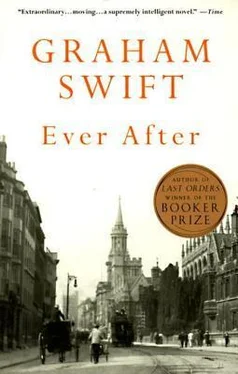For the bare fact is — I have done my additional research: a simple matter of consulting shipping registers — her former husband never reached the New World. The Juno went down on 14th April 1869 in a storm some miles west of the Scillies (what final terror, or acceptance? what revelations, confirmations — wrenched-out prayers?); and among the list of those who perished was Matthew Pearce, surveyor, of Launceston.
But there he sits, for now, on terra firma , in terra cognita , pen in hand, in his lodgings in Plymouth. The rain, a gentle, enclosing rain with no hint of fury to come, patters at the window and induces in him seafaring, far-ranging, spacious thoughts. By the light of the oil-lamp, he fills the page, as once he filled so many pages in his study at Burlford. This need to write it down. To describe it, to know it: this strange land of the living. He describes the rain. He describes the gaggles of displaced miners who mill round Plymouth in the spring of 1869. He says he will go to take one last look at Brunel’s bridge. Memories, and memories of memories, flood in.
A New World. A new life — a new name. Forget it all. Start again. Is it possible? There will always be what remains. He loved her. He wrote it down: that flimsy, romantic thing, a love letter. And Elizabeth? She kept the letter, she kept the Notebooks. She loved him still.
I have dipped into Darwin. It’s heavy going. The prose thick, grey and formidable, like porridge. It is hard to see in this sober stodge the bombshell which tore apart Matthew’s life and horrified Victorian society. Perhaps this proves Darwin’s point. Species adapt . Yesterday’s cataclysm is today’s absorbed fact. Yet it is equally hard to see, behind these plodding, scrupulous, epoch-making words, the man who wrote them. To picture the young Charles Darwin who set sail one day from Plymouth just as Matthew did, though this would have been nearly forty years before, when Matthew was only a boy of twelve, trying to absorb the recent cataclysm of his mother’s death. And the voyage was somewhat longer.
New worlds. New life. Matthew perished barely a day from port. Darwin returned, safe and sound, after five years’ roving, with the inklings of a new picture of the universe.
So was he the adventurous sort? A budding Sir Walter? Hardly. Seasick, it seems, all the time. And comes back not exactly with a booty of rattling yarns. But not, at one time at least, such a dull swot either. A dab-hand with a shot-gun. Footloose, outdoor type. His father, alarmed at his son’s idle ways, steered him first, abortively, towards medicine, then, of all things, towards the Church.
Was there a compartment in Darwin’s later fully freighted mind — a subsection of his own Theory of Natural Selection — which gave due consideration to the question of how individuals who undertake momentous undertakings — are selected? Did he ever ask: but why me? Why me ? The captain of the Beagle , an amateur phrenologist, nearly rejected Darwin as a suitable shipmate on account of the shape of his nose. And it is a well-recorded fact that the great Theory, some twenty years in the forming, was only rushed into publication because someone else — a fellow called Wallace — seemed to have got hold of the same idea. Were it not for the mutual reasonableness of the two parties (not typical, I can vouch, of your rival men of learning) and for the fact that Wallace was tied up at the time in the Celebes, we might have had Wallace’s Theory of Natural Selection — Wallacism, Wallacists and Neo-Wallacists.
But what’s in a name?
So what became of the feckless duck-shooter (and prospective priest)? He signs on, more by chance than design, as naturalist with the Beagle . Voyages for five years to the far corners of the earth. Then ends up a studious and sickly recluse, writing endless notes in a house in Kent. So, he had seen the world? The rest was contemplation? To challenge the universe from a house in Kent!
No, not the adventurous sort. A sufferer, most of his life from mysterious, possibly psychosomatic ailments. And hardly one of your showmen among men of genius. No top hat, cigar and thumb poked in waistcoat pocket. The frontispiece of my copy of The Origin of Species , a late-Victorian edition published within ten years of Darwin’s death, shows a brooding, oracular figure, all flowing beard and thought-furrowed brow, seated on a rickety wicker chair. He looks like the original Hoary Sage. He looks a miserable old codger.
So did he want fame? Was it important, after all, that it was his name on the bombshell? He always maintained that he worked only for the elucidation of truth. Witness those years of painstaking toil before he was finally induced to publish. Did he reflect on the desirability of the elucidation of truth? Did he consider what the effect might be on lesser mortals (was he some greater mortal?) like Matthew Pearce? On the big question, the God question, he seems to have maintained — this one-time candidate for orders — a careful reticence, a curiously bland open-mindedness, an obtuse bewilderment. Reading Darwin, you sometimes get the feeling that the man was — dim. It was not his business to settle questions of final causes; it was his business only (only!) to elucidate the truth.
And where did it get him, this devotion to the truth? A gnarled and lugubrious septuagenarian in his creaking wicker chair, author of hundreds of pages of meticulous, fatiguing, world-shattering prose.
I pick at the Journal (this magpie scholarship), struggle with the Origin , home in on the letters and the Autobiography . There is a passage in the latter where the author laments the gradual loss of all taste for poetry, likewise, virtually, for music, painting and fine scenery, and speculates (ever the man of science) on what has caused the atrophy of the relevant parts of the brain. Is he trying to tell us something? In 1858, the year before the Origin appeared, and before, presumably, the “atrophy” set in, he wrote, while on one of his numerous “cures” in the country, to Mrs D. (with whom, by the way, there was never a rupture, and with whom, for all his ill health and monumental toil, he begat seven children):
The weather is quite delicious. Yesterday, after writing to you, I strolled a little beyond the glade for an hour and a half and enjoyed myself — the fresh yet dark green of the grand Scotch firs, the brown of the catkins of the old birches, with their white stems, and a fringe of distant green from the larches, made an excessively pretty view. At last I fell asleep on the grass, and awoke with a chorus of birds singing around me, and squirrels running up the trees, and some woodpeckers laughing, and it was as pleasant and rural a scene as I ever saw, and I did not care one penny how any of the beasts or birds had been formed .
These great men of ideas, they get turned themselves into ideas. So Darwin becomes a kind of abstract condition, a sort of irrevocable tinge that settled on the world around the middle of the nineteenth century. The world before Darwin, the world after Darwin. Who thinks of Darwin the man? Was he a man or a mind? Who thinks of Newton the man? Save, of course, to picture him in that legendary reverie, not unlike Darwin’s idyll (Darwin in nature’s playground!), ensconced beneath an apple tree — a reverie shattered by the Law of Gravity. The apple, of course, provides a resonantly Edenesque touch. These men of knowledge. These meddlers with the universe. Darwin, they say, was the Newton of biology. If Darwin was the Newton of biology, then Einstein was the Darwin of physics.
In the red-brick village of Aldermaston, there used to be a little tea-shop, of the welcoming but unassuming kind (a cool, oaky demureness, even on a hot summer’s day) now virtually vanished from rural England; and there, one day in the first summer of peace, my mother took me and told me about the William’s pear.
Читать дальше












